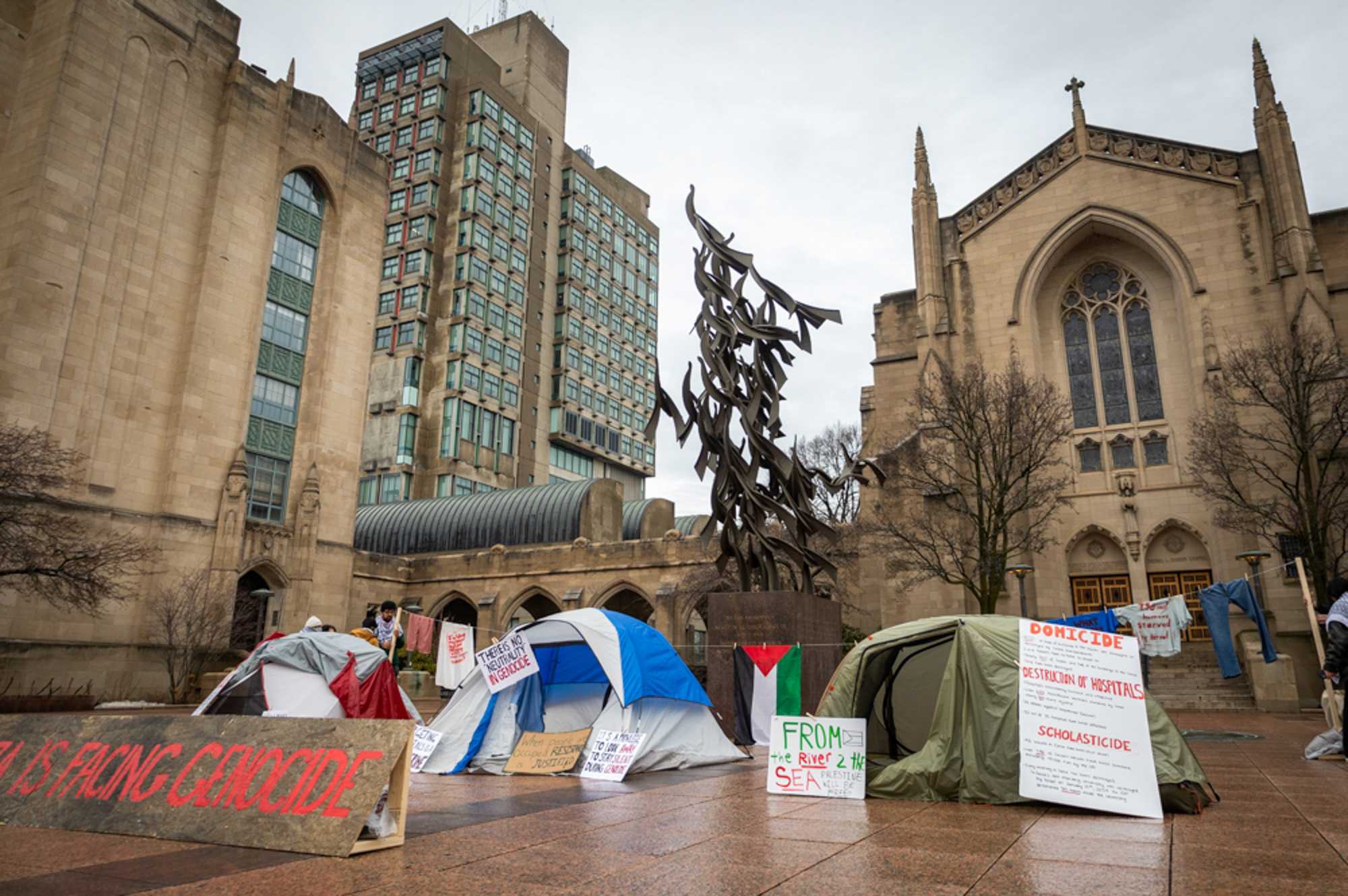Final exams and graduation ceremonies at Boston University were canceled due to Vietnam War protests May 6, 1970 — the same day The Daily Free Press released its first-ever issue.

“Vandals broke into the [Dahod Family Alumni Center at the Castle], spray painted the walls and furniture, and splashed wine across the carpet,” wrote The Daily Free Press Editor-in-Chief Gene Johnson in a 1998 “Letter From the Editor,” reflecting on the paper’s beginnings.
“Thousands of antiwar protesters swarmed Nickerson Field,” Johnson wrote.
Almost 55 years later, protests on campus haven’t slowed down.
More than 100 attendees gathered at Marsh Plaza March 28 before marching down Commonwealth Avenue chanting “Boston University, we know what side you’re on. Remember South Africa, remember Vietnam,” referencing former student protests in the 1960s and 1980s.
BU saw some of the largest anti-war protests in the ‘60s and ‘70s, followed by anti-apartheid protests in the ‘80s.
In 1985, about 200 students attended the “Rally for Justice at Boston University” at Marsh Plaza, protesting divestiture in South Africa and President Ronald Reagan’s budget cuts.
The following year, 11 BU students were arrested at the George Sherman Union for building a “shanty” to raise awareness of South African apartheid.
“Things like student protest over what their universities are choosing to invest in is something that’s a perennial thing,” said Jason Pramas, one of the 11 students.
Pramas attended BU from September 1984 to June 1986 until he was “thrown out” for activist work against South African apartheid, he said.
Cheryl Townsend Gilkes, a former assistant professor of sociology at BU who spoke at an April 10, 1985, anti-apartheid rally, said student activism is more “complex” now, partly due to institutional response.
“Things have changed over time,” Gilkes said. “The impact of international students, the burgeoning of various kinds of cultural studies that can be attacked and also looked at as a resource on the part of students. A whole range of differences between what happened in the late 1960s and what happens now.”
Zachary Bos, former BU student and current president of UAW Local 2324, the union representing higher education staff at BU, said he has observed a “fundamental shift” in campus activism.
“Thanks to telecommunications, we could mediate the relationships we chose, and that became a feedback loop where the campus world and the social world diverged and they no longer overlap anywhere near as powerfully,” Bos said. “Change in the way that campus life takes place coincides with a very visible change in campus activism and campus media.”
Pramas said he remembers passing out physical leaflets and hanging posters to advertise demonstrations when he was a student.
“We were talking to people more directly,” he said.
Pramas said during his time at BU, the University was “run like a dictatorship,” as he recalls efforts from the University to curb activism, including tearing down posters.
“The administration would do their level best to stop us from communicating with fellow students,” Pramas said.
Today, many student organizations post on social media platforms like Instagram to announce protests and gatherings.
“Nowadays, protesters are their own reporters, their own publishers and editors,” Bos said. “When I started school at BU, a story broke on campus just like it would break in Boston, because it was on the front page of The Daily Free Press. Now … the story breaks on social media.”
Mary Battenfeld, a clinical professor of American studies at BU, said she had been arrested several times as a student at the University of Maryland for her involvement in campus protests and said students’ drive to enact change will transcend time.
“Students are the ones who are willing to stand up,” Battenfeld said. “Those are what make the difference.”
Battenfeld said despite students serving as the face of campus activism, many professors are working behind the scenes.
“Sometimes professors are reluctant to be involved, because it is the students who are leading,” Battenfeld said.
BU student AB, who requested The Daily Free Press use a nickname to protect her identity, has participated in her own share of student advocacy, including a recent “emergency rally” held by Students for Justice in Palestine March 5.
Protesters at the rally urged administrators from the Office of the President to respect the results of a university-wide referendum calling for divestment in companies “actively complicit in human rights violations in the Middle East” that received overwhelming student support.
AB said she doesn’t think campus protests are at a point of changing the University’s actions.
“We’re at a point right now where student groups are the most organized they have been in a couple years,” AB said. “There’s a lot of coalition building and a lot of teamwork happening between different clubs, so I think we’re seeing more consistent, more organized and more effective protests.”
Bos said the University community should remember BU’s long history of student activism, and the student journalists who have covered it along the way.
“BU students today are not alone. They are connected to decades of activism and decades of journalism,” Bos said. “The past is a map, and our journalists and our activists today are continuing to follow that map to traverse the same landscape.”





















































































































Delia Greenfelder • Apr 5, 2025 at 7:17 am
Great article! It’s inspiring to see how much the BU community has fought for change over the decades. The activism on campus really shapes the culture and future generations. Looking forward to more discussions on this topic!
Delia Greenfelder • Apr 5, 2025 at 7:16 am
This article beautifully captures the essence of activism at BU. It’s inspiring to see how far we’ve come and the impact of our collective voices over the years!